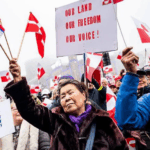
The Minority in Parliament has criticised the government’s handling of the cedi, saying that despite billions of dollars spent on foreign exchange interventions, the local currency remains weak.
Speaking to the press on Friday, November 14, on behalf of the Minority, former Finance Minister Amin Adam said, “With the significant billions of dollars of interventions, we expected the rate to be at GH₵8 to a Dollar. The market’s muted response reveals a sophisticated understanding that currency strength cannot be purchased; it must be earned through sound economic fundamentals.”
He criticised the government for relying on short-term market support rather than addressing the structural weaknesses of the economy.
He pointed to the Bank of Ghana’s approach to currency management, noting that under the IMF programme during the NPP administration, foreign exchange interventions were carefully limited to balance market support with the preservation of reserves.
“During the NPP administration, the IMF restricted the Bank of Ghana from intervening heavily in the forex market. The intervention budget was fixed at US$80 million per month, despite international reserves exceeding the IMF target. By the end of 2024, reserves stood at almost US$9 billion,” he explained.
He said that the gains in the cedi’s value under the current government were not due to new policy but to reserves accumulated before the administration took office.
“The new Bank of Ghana management and the government began injecting massive sums of forex into the market from reserves they inherited. The performance of the cedi is therefore not by any magic or policy intervention; it is due to the hard work under the NPP administration,” he said.
According to the Minority, the Bank of Ghana has injected roughly US$8 billion into the market since January, lowering the exchange rate from about GH₵14 per dollar on January 6, 2025, to almost GH₵11 per dollar. “Despite these burdensome interventions, the gains remain disappointingly modest and fundamentally unsustainable.”
He further criticised what he called “propaganda management” of the economy. “Did it not prick your conscience when, in touting government management of the cedi, the Minister used the exchange rate for November 2024 of GH₵16 to the dollar to show unprecedented appreciation, instead of the rate of GH₵14 on January 6, 2025, a day before they assumed office? Merely repeating an untruth does not make it the truth,” he said.
The Minority also warned that heavy market interventions have put stress on international reserves, while the economy’s structural weaknesses, low productivity, weak export performance, and limited foreign exchange from exporters remain unaddressed.
“These resources have been squandered on temporary cosmetic improvements that will inevitably reverse once intervention capacity is exhausted.”
He noted that the Bank of Ghana has recently introduced a new framework, prepared with the IMF, to guide future market interventions.
“For the first time, the Bank has admitted that the cedi’s appreciation has mainly been due to market intervention. It has also conceded that its previous approach was non-transparent and unsustainable, as it could jeopardise the reserves needed as a buffer against international shocks,” he explained.
“While the Bank promises to continue interventions to dampen short-term volatility without undermining exchange rate flexibility, at least it now intends to do so in a measured and transparent manner. This is the responsible approach our economy desperately needs,” he added.



